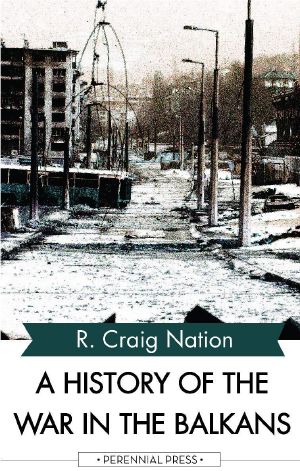A History of the War in the Balkans 1991-2002

- Authors
- Nation, R. Craig
- Publisher
- Didactic Press
- Tags
- balkans , milosevic , bosnia , dr. , macedonia , nation , war , 1991-2002 , army , policy , military , sfor , dayton , security , craig , intervention , middle , humanitarian , ifor , national , conflict , strategy , emerging , concepts , east , the , strategic , in , leadership , europe , futures , r. , bosnia-herzegovina , this study is one of very few works that attempts to look at the war as a whole it emphasizes the impact of the conflict upon the entire balkan region_ the dynamics of international intervention_ and the special role of the u.s. armed forces. , kosovo , africa , north , balkan , asia , profession , eastern
- ISBN
- 9781531263348
- Date
- 2015-11-10T00:00:00+00:00
- Size
- 0.87 MB
- Lang
- en
The Balkans is often described as a grim backwater, a “no man’s land of world politics” in the words of a post-World War II study “foredoomed to conflict springing from heterogeneity.” The stereotype is false, but it has been distressingly influential in shaping perceptions of the Balkan conflict and its origin. By encouraging pessimism about prospects for recovery, it may also make it more difficult to sustain commitments to post conflict peace building. This book seeks to refute simplistic “ancient hatreds” explanations by looking carefully at the sources and dynamics of the Balkan conflict in all of its dimensions.
Chapter One attempts to define the Balkans as a region and specify the kinds of historical trends that led to its marginalization in the modern period.
Chapter Two looks at the evolution of the region during Eric Hobsbawm’s short twentieth century, with special emphasis upon the strengths and weaknesses of the Yugoslav idea and post-World War II projects for an enlarged Balkan federation.
Chapter Three turns to the long crisis of Yugoslav federalism following the death of Josip Broz Tito in 1980, culminating with the wars of secession in Slovenia and Croatia.
Chapters Four and Five analyze the conflicts in Bosnia-Herzegovina and Kosovo with an eye to the problematic nature of the resolutions imposed by international intervention.
The sixth chapter steps outside the confines of former Yugoslavia to focus on Greek-Turkish relations and the Cyprus question, regarded as particularly significant pieces of the Balkan regional puzzle, and as critical issues in any longterm program for recasting regional order.
In Chapter Seven the aftermath of the conflicts of the 1990s is examined, with an analysis of the flare up of ethnic violence in Macedonia during 2000-2001 added to the mix.
Though this is essentially a political history arranged as a chronological narrative, I attempt to place the conflict in the broadest possible context, with attention drawn to historical, cultural, political, and strategic variables. This is, I would assert, the most appropriate way to come to terms with the war’s specific character and historical weight.